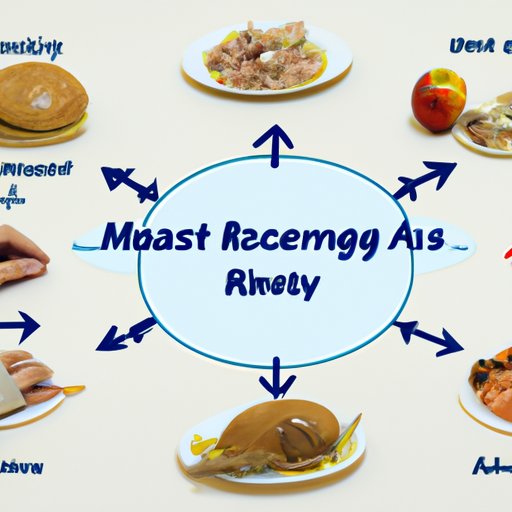
Introduction
MRI or magnetic resonance imaging is a common diagnostic tool that helps doctors to see inside your body without invasive surgery. It uses a strong magnetic field and radio waves to generate detailed images of organs, tissues, and bones. If your doctor has recommended that you undergo an MRI, you might be curious as to whether or not you can eat before the procedure. This article will help you to understand the eating guidelines for your MRI scan and why they are important.
Everything You Need to Know About Eating Before an MRI Scan
An MRI scan is a non-invasive test that uses a large magnet, radio waves, and a computer to produce detailed images of the body. The test is usually done to diagnose a wide range of medical conditions such as stroke, cancer, heart disease, and joint problems. However, some people wonder whether they can eat before their MRI appointment.
The short answer is that it depends on the type of MRI scan you are having. Some scans require you to fast before the test, while others do not. Your doctor will give you specific instructions about what to eat and what not to eat before your procedure.
The Dos and Don’ts of Eating Before Your MRI Appointment
If your doctor has instructed you to fast before your MRI scan, it means you should not eat or drink anything for a certain period of time before the test. This includes water, chewing gum, and even medication.
On the other hand, if your doctor has not restricted your diet, you can eat and drink as you normally would before coming to the hospital. However, it’s essential to avoid certain foods and drinks that can interfere with the MRI scan. These include:
- Alcohol
- Caffeine
- Chewing gum
- Any food that contains iron
- Barium sulfate
- Any medication containing dyes or contrast agents
It’s important to follow these guidelines so that the results of your scan are as accurate as possible. Certain foods and drinks can interfere with the magnetic field and produce unclear images, which can affect your diagnosis.
Why Fasting Before an MRI May Be Recommended
If your doctor has asked you to fast before your MRI scan, it’s because fasting can help produce clearer images. Specifically, fasting can reduce the amount of fluid and gas in your digestive tract, which can otherwise interfere with the MRI scan.
For example, if you were to eat a large meal before your MRI scan, particles of food and drink can fill your stomach and small intestine, causing them to move or change shape. This movement can cause unwanted distortion or blurring in the images produced by the MRI scan, making it difficult for doctors to make an accurate diagnosis. By fasting before your scan, you can help to minimize these risks.
Understanding the Risks of Eating Before an MRI Scan
If you eat or drink anything that is not allowed before your MRI scan, it can affect the quality of the images produced. For example, some foods contain metal, such as iron or magnesium, which can cause unwanted interference with the magnetic field and produce unclear images.
Additionally, some drinks like coffee and tea contain caffeine, which can stimulate your body and cause your heart rate to increase. This increased heart rate can cause unwanted movement during the scan, leading to unclear images. Therefore, it’s essential to avoid foods and drinks that can affect the quality of your scan.

How to Prepare for Your MRI Scan: Eating Guidelines You Should Follow
If your doctor has instructed you not to eat or drink anything before your MRI scan, you should follow these general guidelines:
- Avoid eating or drinking anything for at least 4-6 hours before the test.
- Avoid chew gum or mints, as this can stimulate your digestive system and cause movement during the scan.
- If you are taking medication, check with your doctor whether you should stop taking it before the test.
- If you are breastfeeding or pregnant, inform your doctor and follow their guidelines accordingly.
It’s essential to follow your doctor’s instructions closely to ensure that the MRI scan produces accurate results. If you have any questions or concerns about preparing for your scan, talk to your doctor or healthcare provider.
Breaking Down the MRI Process: Why Eating Before Your Scan Can Affect the Results
The MRI scan process involves lying down on a table that slides into a tunnel-like machine. During the scan, you will hear loud knocking noises, which can be uncomfortable. However, the scan itself is painless and generally lasts between 30 to 60 minutes.
One reason eating before your MRI scan can affect the results is that it can cause unwanted movement during the scan. Additionally, if you eat foods high in iron, it can produce an artifact that may be mistaken for pathology or disease. Therefore, it’s essential to follow the eating guidelines given by your doctor to ensure that your scan is accurate.
The Discomfort of Anesthesia and Why Eating Before an MRI can Help
In some cases, doctors may give you anesthesia during your MRI scan to help you relax or reduce discomfort. However, anesthesia can have side effects such as nausea or vomiting, particularly if you undergo general anesthesia. If you have something in your stomach, it may cause you to vomit or feel nauseous during the scan.
Therefore, it’s essential to follow the fasting guidelines to help reduce the risk of these side effects. Additionally, if you are having contrast dye injected, which is sometimes used to help highlight specific areas of the body, it can be hard on your kidneys. This makes it essential to fast before your MRI scan to reduce the risks of side effects.
Conclusion
Overall, if you’re undergoing an MRI scan, it’s essential to follow the eating guidelines given by your doctor. Whether or not you can eat before your MRI scan depends on the type of scan you’re having and your specific situation. If your doctor has instructed you to fast, it’s essential to follow the fasting guidelines to ensure that your scan produces accurate results. If you have any questions or concerns about preparing for your MRI scan, be sure to consult with your doctor or healthcare provider.





